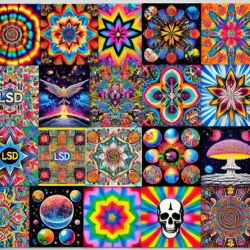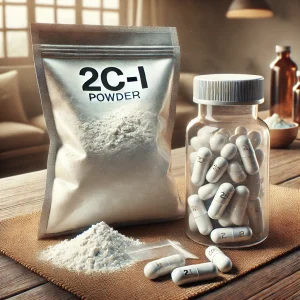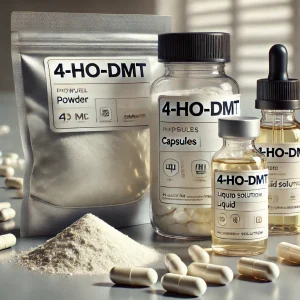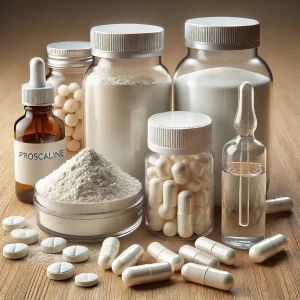Description
What is LSD, and How Does it Work?
LSD, or lysergic acid diethylamide, is a potent hallucinogenic drug known for its profound psychological effects. It was first synthesized in 1938 by Swiss chemist Albert Hofmann from ergot, a fungus that grows on rye. LSD works by interacting with serotonin receptors in the brain, particularly the 5-HT2A receptor. This interaction leads to altered perceptions, emotions, and cognition.
- Chemical Structure: LSD is derived from lysergic acid, which is a component of ergot alkaloids. Its chemical structure allows it to bind effectively to serotonin receptors in the brain.
- Mechanism of Action: LSD binds to serotonin receptors, leading to increased levels of serotonin, which affects mood, perception, and thought processes. This binding results in the activation of neural circuits involved in sensory perception and emotion regulation.
- Effects: Users often experience vivid visual and auditory hallucinations, a distorted sense of time, and enhanced sensory experiences. These effects can vary widely depending on the dose, the individual’s state of mind, and the environment in which it is taken.
Is it Legal to Buy LSD Online?
No, buying LSD online is illegal in most countries. LSD is classified as a Schedule I substance under the Controlled Substances Act in the United States, meaning it has a high potential for abuse and no accepted medical use. The penalties for purchasing or possessing LSD can be severe, including hefty fines and imprisonment.
- Legal Status: LSD is illegal in most parts of the world, including the U.S., Canada, the U.K., and Australia. Each country has its own specific laws regarding LSD, but most classify it as a controlled substance with severe penalties for possession and distribution.
- Penalties: Possession or distribution can lead to fines, imprisonment, and a permanent criminal record. In some jurisdictions, even small amounts can result in significant legal consequences.
- Risks: Buying LSD online carries additional risks, such as scams, impure substances, and legal consequences. Many online sources are unregulated, making it difficult to verify the quality and authenticity of the product.
Where Can I Safely Purchase LSD?
Purchasing LSD safely involves significant risks due to its illegal status. However, for those seeking a reliable source, we at Golden Psycho offer discreet packaging and delivery worldwide, ensuring your privacy and security.
- Discreet Packaging: We use plain, unmarked packaging to ensure privacy. This minimizes the risk of the package being identified as containing illegal substances.
- Secure Delivery: Our deliveries are tracked, and we offer overnight discreet delivery. Tracking provides peace of mind and allows you to monitor the shipment’s progress.
- Customer Satisfaction: We have a 30-day full refund or replacement policy. This guarantees your satisfaction and ensures that you receive a product that meets your expectations.
How Can I Identify Authentic LSD from Fake Products?
Authentic LSD is typically sold in the form of blotter paper, liquid, or small tablets. Identifying real LSD can be challenging, but here are some tips:
- Blotter Paper: Often decorated with colorful designs or artwork. Genuine blotter paper will have evenly distributed doses, usually cut into small squares.
- Liquid LSD: Usually clear or slightly colored, dispensed with a dropper bottle. It should not have a strong chemical odor, which can indicate impurities.
- Tablets (Microdots): Small, often white or light-colored, with no significant markings. These tablets are typically very small, making them easy to conceal and transport.
Fake LSD, often sold as NBOMe or other dangerous substances, can have different forms and effects. Always source LSD from reputable suppliers like Golden Psycho to avoid these risks. We ensure that our products are genuine and of high quality.
How Can I Find a Reputable LSD Supplier?
Finding a reputable LSD supplier is crucial for ensuring safety and quality. Here are some tips:
- Research: Look for suppliers with positive reviews and a strong reputation. Online forums, review sites, and word-of-mouth recommendations can be valuable resources.
- Quality Assurance: Ensure the supplier provides product testing and quality control. This can include lab results or certifications that verify the purity and potency of the LSD.
- Customer Service: Reliable suppliers will offer good customer support and clear policies. This includes responsive communication, clear return policies, and a satisfaction guarantee.
At Golden Psycho, we prioritize your safety by offering high-quality LSD with discreet and secure delivery methods. We guarantee customer satisfaction and provide a 30-day refund or replacement policy.
What Should I Know Before Taking LSD for the First Time?
Before taking LSD for the first time, it’s essential to be well-prepared. Consider the following:
- Set and Setting: Ensure you are in a safe, comfortable environment with trusted people around. A familiar and calm setting can help prevent anxiety or panic during the trip.
- Mental State: Be in a positive, stable mental state. Avoid taking LSD if you are feeling anxious or depressed. Your mental state can greatly influence the nature of your trip.
- Dosage: Start with a low dose (50-75 micrograms) to gauge your reaction. This allows you to understand how your body and mind respond to the substance without overwhelming yourself.
Taking these precautions can help ensure a positive and safe experience with LSD.
What Are the Effects of Taking LSD?
LSD induces a range of effects, which can vary greatly from person to person. Common effects include:
- Visual Hallucinations: Seeing patterns, colors, and shapes that aren’t there. These can be intricate and vivid, often described as kaleidoscopic or fractal.
- Altered Perception: Changes in how you perceive time and space. Time may seem to slow down or speed up, and distances may appear distorted.
- Emotional Changes: Intense emotions, both positive and negative. Users may experience euphoria, awe, or anxiety, sometimes cycling through different emotions rapidly.
LSD can also enhance sensory experiences, making music, art, and nature more profound and enjoyable.
What is the Typical Dosage for LSD?
The typical dosage for LSD ranges from 50 to 150 micrograms. It’s crucial to start with a lower dose, especially for beginners, to understand how your body reacts.
- Microdosing: 10-20 micrograms. Often used for cognitive enhancement without full hallucinogenic effects. Users report increased focus, creativity, and mood stabilization.
- Low Dose: 50-75 micrograms. Suitable for beginners to gauge their reaction. This dose can produce noticeable effects without being overwhelming.
- Standard Dose: 100-150 micrograms. Typical recreational dose with full effects, including strong visual and perceptual changes.
Always measure your dosage carefully to avoid taking too much.
How Long Do the Effects of LSD Last?
The effects of LSD typically last between 8 to 12 hours, though the experience can vary:
- Onset: 30 to 90 minutes after ingestion. Users may feel slight changes in perception and mood as the drug takes effect.
- Peak: 2 to 4 hours after onset, where effects are most intense. Visual and sensory distortions are strongest during this period.
- Duration: 8 to 12 hours, with gradual comedown. The effects slowly diminish, but residual changes in perception and mood can last longer.
The intensity and duration of the trip depend on the dose, individual physiology, and set and setting.
What Are the Risks and Side Effects of Using LSD?
LSD can cause several risks and side effects, including:
- Psychological Distress: Anxiety, paranoia, and panic attacks. Some users may experience fear or confusion during the trip.
- Physical Effects: Increased heart rate, sweating, nausea, and dilated pupils. These effects are generally mild but can be uncomfortable.
- Hallucinogen Persisting Perception Disorder (HPPD): Long-term visual disturbances, such as seeing halos around objects or trails of light.
Using LSD in a safe, controlled environment can help mitigate some of these risks. Always have a trusted person present if possible.
Can I Develop a Tolerance to LSD?
Yes, you can develop a tolerance to LSD with regular use. Tolerance builds quickly, often after just a few consecutive uses, and can diminish the effects of the drug.
- Tolerance: Rapidly increases with frequent use, requiring higher doses to achieve the same effects. Tolerance typically returns to baseline after a week of abstinence.
- Cross-Tolerance: Can occur with other psychedelics, such as psilocybin and mescaline. This means that tolerance to one psychedelic can reduce the effects of another.
- Reset: Tolerance typically returns to baseline after about a week of abstinence. Taking breaks between uses can help maintain the drug’s effectiveness.
Avoid using LSD frequently to prevent tolerance and maintain the potency of the experience.
Are There Any Long-Term Effects of Using LSD?
Long-term effects of LSD can include:
- HPPD: Persistent visual disturbances, such as seeing halos around objects or trails of light. This condition is rare but can be distressing.
- Psychological Effects: Potential for lasting changes in mood and perception. Some users report positive long-term changes, such as increased creativity and openness, while others may experience negative effects.
Most long-term effects are rare and typically associated with heavy, frequent use. Responsible use and proper set and setting can help minimize these risks.
What Are the Legal Penalties for Possessing LSD?
Possessing LSD can result in severe legal penalties, including:
- Fines: Monetary penalties that can be substantial. These can vary based on the amount of LSD and the jurisdiction.
- Imprisonment: Jail or prison time, which can vary depending on the amount and intent (personal use vs. distribution). Sentences can range from a few months to several years.
- Criminal Record: Long-term impacts on employment, education, and travel opportunities. A criminal record for drug possession can have lasting consequences on your personal and professional life.
Always be aware of the legal implications in your country before purchasing or using LSD.
Can I Travel with LSD?
Traveling with LSD is highly risky and illegal. Possession can lead to arrest and severe penalties, especially in countries with strict drug laws.
- Airport Security: Increased risk of detection and severe penalties if caught. Security measures are stringent, and drug-sniffing dogs are often used.
- International Laws: Vary greatly, with some countries having very harsh penalties for drug offenses. In some places, drug trafficking can result in life imprisonment or even the death penalty.
- Travel Advice: Avoid carrying LSD when traveling to avoid legal trouble. It’s best to leave LSD at home if you plan to travel.
It’s best to leave LSD at home if you plan to travel.
How Should I Store LSD to Maintain Its Potency?
To maintain LSD’s potency, proper storage is essential:
- Cool Environment: Store in a cool, dark place. Heat can degrade the substance. Ideal storage temperatures are below 20°C (68°F).
- Airtight Container: Use an airtight container to protect from moisture and air. This prevents oxidation and degradation of the LSD.
- Avoid Light: Light can break down LSD, so keep it in a dark place. Lightproof containers or aluminum foil can help shield the LSD from light exposure.
Proper storage ensures that LSD retains its potency and effectiveness over time.
How Does LSD Compare to Other Psychedelics?
LSD is known for its long-lasting and intense effects compared to other psychedelics like psilocybin mushrooms or MDMA. Here are some comparisons:
- Duration: LSD lasts 8-12 hours, while psilocybin lasts 4-6 hours, and MDMA lasts 3-5 hours. The longer duration of LSD means a more extended commitment for users.
- Intensity: LSD often provides more vivid visual and sensory experiences. Users report seeing complex geometric patterns and vibrant colors.
- Mental Effects: LSD can induce profound philosophical and introspective thoughts, while MDMA is more empathetic and psilocybin is more earthy and connected to nature. Each psychedelic offers a unique mental experience, suited to different purposes and preferences.
Each psychedelic has unique characteristics, and users often choose based on their desired experience.
Are There Any Interactions Between LSD and Other Medications?
LSD can interact with various medications, including:
- Antidepressants: Can alter the effects of LSD, potentially reducing its effectiveness or increasing side effects. SSRIs and MAOIs are known to interact with LSD.
- Antipsychotics: May diminish the effects of LSD, used to manage bad trips. Medications like risperidone and olanzapine can counteract the effects of LSD.
- Stimulants: Increase the risk of adverse psychological reactions, such as anxiety and paranoia. Combining LSD with stimulants like amphetamines or cocaine can be dangerous.
Always consult with a healthcare professional before combining LSD with any medications.
What Should I Do if I Have a Bad Reaction to LSD?
If you have a bad reaction to LSD, follow these steps:
- Stay Calm: Find a safe, quiet place to relax. Try to stay calm and remember that the effects are temporary.
- Seek Help: Have a trusted person stay with you to provide support. Their presence can be reassuring and help you stay grounded.
- Hydrate: Drink water to stay hydrated and help your body process the substance. Avoid alcohol or caffeine, which can exacerbate anxiety.
A bad trip can be managed with the right support and environment.
How Can I Help Someone Having a Bad Trip on LSD?
To help someone having a bad trip:
- Stay Calm: Reassure them and stay composed. Your calm demeanor can help reduce their anxiety.
- Create a Safe Space: Remove any potential hazards and create a comfortable environment. A quiet, dimly lit room can be soothing.
- Provide Comfort: Offer soothing words, a calm environment, and stay with them until they feel better. Encourage them to focus on their breathing and remind them that the effects are temporary.
Supporting someone through a bad trip can help them recover more quickly.
What Are the Signs of an LSD Overdose?
Signs of an LSD overdose can include:
- Severe Anxiety: Intense fear, paranoia, and panic attacks. The user may feel overwhelmed and unable to cope.
- Physical Symptoms: High blood pressure, rapid heartbeat, and sweating. These symptoms can be alarming but are usually not life-threatening.
- Psychosis: Hallucinations, delusions, and loss of contact with reality. In rare cases, users may experience a break from reality that requires medical intervention.
Seek medical help if you suspect an LSD overdose.
Is It Safe to Use LSD for Mental Health Treatment?
Using LSD for mental health treatment is still under research. While some studies show promise, it should only be used under medical supervision.
- PTSD: Some studies suggest LSD can help reduce symptoms. LSD-assisted therapy has shown potential in helping patients process traumatic memories.
- Depression: Early research shows potential in alleviating severe depression. LSD may help by promoting neuroplasticity and new ways of thinking.
- Anxiety: LSD has shown promise in managing anxiety disorders, particularly in terminally ill patients facing end-of-life issues.
Always consult a healthcare professional before considering LSD for mental health treatment.
Are There Any Studies on the Therapeutic Use of LSD?
Yes, there are studies indicating that LSD can help with:
- PTSD: Reducing symptoms and improving quality of life. LSD-assisted therapy can help patients reprocess traumatic events in a controlled setting.
- Depression: Alleviating severe depression and promoting emotional well-being. Studies have found that LSD can induce lasting positive changes in mood and outlook.
- Anxiety: Managing anxiety, particularly in terminally ill patients. LSD can help reduce existential anxiety and improve acceptance of mortality.
These studies are ongoing, and more research is needed to fully understand LSD’s therapeutic potential.
What Are the Benefits of Microdosing LSD?
Microdosing LSD involves taking small, sub-hallucinogenic doses. Benefits can include:
- Improved Mood: Enhanced emotional well-being and reduced symptoms of depression. Users report feeling more positive and motivated.
- Increased Focus: Better concentration, productivity, and creativity. Many users find that microdosing enhances their ability to solve problems and think creatively.
- Reduced Anxiety: Lower levels of stress and anxiety without full hallucinogenic effects. Microdosing can help manage everyday stressors and improve overall mental health.
Microdosing can offer the benefits of LSD without the intense experience of a full dose.
What Should I Expect During an LSD Trip?
During an LSD trip, expect:
- Visual Distortions: Patterns, colors, and shapes that aren’t there. These can be intricate and vivid, often described as kaleidoscopic or fractal.
- Altered Thoughts: New perspectives and ideas, often philosophical or introspective. Users may experience profound insights or shifts in perception.
- Emotional Shifts: Intense and fluctuating emotions, ranging from euphoria to anxiety. The emotional experience can be deeply personal and transformative.
Each trip is unique, and the experience can vary greatly from person to person.
How Does LSD Affect the Brain?
LSD affects the brain by altering serotonin receptors, particularly the 5-HT2A receptor. This leads to changes in mood, perception, and cognition.
- Serotonin: LSD increases serotonin levels, affecting mood and perception. This neurotransmitter plays a key role in regulating mood, sleep, and sensory perception.
- Neuroplasticity: Some studies suggest LSD can promote neuroplasticity, potentially aiding in mental health treatment. This means LSD may help the brain form new neural connections, which can improve cognitive flexibility and emotional regulation.
Understanding how LSD affects the brain can help explain its profound effects on consciousness and perception.
What is the History and Cultural Significance of LSD?
LSD was first synthesized in 1938 by Albert Hofmann. It gained popularity in the 1960s counterculture movement and has since been studied for its potential therapeutic uses.
- Discovery: Albert Hofmann accidentally discovered LSD’s effects in 1943. He experienced the first recorded LSD trip, which he described as a “bicycle day” due to his vivid sensory experiences while riding home.
- Counterculture Movement: LSD became a symbol of the 1960s counterculture, influencing music, art, and social movements. It was popularized by figures like Timothy Leary and became associated with the anti-establishment and peace movements.
- Therapeutic Research: Early research in the 1950s and 1960s explored LSD’s potential for treating mental health disorders. Despite a subsequent period of prohibition, recent years have seen a resurgence of interest in its therapeutic applications.
LSD’s history is rich and complex, reflecting its impact on science, culture, and society.
Can LSD Be Detected in a Drug Test?
Standard drug tests do not typically screen for LSD. However, specialized tests can detect LSD and its metabolites in the blood, urine, or hair.
- Blood Tests: Can detect LSD for up to 12 hours after use. Blood tests are less common due to the short detection window.
- Urine Tests: Can detect LSD for up to 8 hours after use. Urine tests are more practical for detecting recent use.
- Hair Tests: Can detect LSD for up to 90 days after use. Hair tests can provide a long-term record of drug use but are rarely used for LSD.
Knowing this can help users understand the potential for detection and privacy concerns.
What Are Common Myths and Misconceptions About LSD?
Common myths about LSD include:
- Permanent Damage: LSD does not cause permanent brain damage. Most users return to their normal mental state after the effects wear off.
- Addiction: LSD is not physically addictive, although psychological dependence can occur. Users do not develop a physical craving for the drug.
- Chromosomal Damage: No scientific evidence supports the claim that LSD causes chromosomal damage. Early studies that suggested this have been debunked.
Understanding these myths can help users make informed decisions about LSD use.
Can LSD Be Used for Spiritual or Religious Experiences?
Yes, LSD has been used for spiritual and religious experiences, providing profound insights and a sense of connection to the universe.
- Mystical Experiences: Users often report feelings of unity, transcendence, and connection to a higher power. These experiences can be deeply meaningful and transformative.
- Cultural Practices: Some cultures and spiritual groups incorporate LSD into their rituals and practices. This includes modern spiritual movements as well as indigenous traditions that use natural psychedelics.
LSD’s potential to induce spiritual experiences has been recognized and explored by various religious and spiritual traditions.
What Should I Do if I Want to Stop Using LSD?
If you want to stop using LSD:
- Seek Support: Talk to a counselor or support group for guidance and encouragement. Professional support can provide coping strategies and emotional assistance.
- Stay Busy: Engage in healthy activities, such as exercise, hobbies, and socializing. Keeping active can help distract from cravings and improve overall well-being.
- Avoid Triggers: Stay away from environments or people that encourage LSD use. Identifying and avoiding triggers can help prevent relapse.
Stopping LSD use can be challenging, but with the right support and strategies, it is possible to quit successfully.
Conclusion
LSD is a powerful psychedelic with a complex profile. While it offers potential benefits, it also comes with risks. For those looking to buy LSD, understanding its effects, legal implications, and proper usage is crucial. At Golden Psycho, we ensure a safe and discreet purchasing experience with worldwide delivery, secured payment, and a 30-day full refund or replacement policy. We prioritize your privacy and satisfaction, making us the most reliable source for LSD. Always remember to approach LSD with caution and respect its powerful effects.
For more information and to purchase LSD discreetly, visit Golden Psycho. We guarantee 100% customer satisfaction and the utmost privacy in all transactions.




